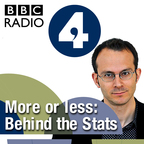
More or Less: Behind the Stats
Summary: Tim Harford investigates numbers in the news. Numbers are used in every area of public debate. But are they always reliable? Tim and the More or Less team try to make sense of the statistics which surround us. A half-hour programme broadcast at 1600 on Friday afternoons and repeated at 2000 on Sundays on Radio 4. BBC World Service broadcasts a short edition over the weekend.
- Visit Website
- RSS
- Artist: BBC Radio 4
- Copyright: (C) BBC 2015
Podcasts:
Nate Silver tells us who will win the 2012 US election - and how he knows.
Only 100 cod are left in the North Sea according to newspapers. Is this the most wrong headline in More or Less history?
US Presidential Election factchecked. Is Mitt Romney right to say that 47% of Americans pay no tax? And how many jobs has President Obama really created?
Ruth Alexander investigates Sweden's high rape rate, and finds out which countries are the surprise leaders of the world kidnap league. Plus, who went home from the London 2012 Games with more medals – Olympians or Paralympians? This programme was first broadcast on the BBC World Service
Why did the USA top the gold medals league in the Olympics, but not the Paralympics? Ruth Alexander examines the performance numbers of the London 2012 Paralympic Games and discovers which countries are punching above their weight, and which below. And Yan Wong tries to calculate how many opening bars are possible in music. This programme was first broadcast on the BBC World Service.
‘What’s the number before infinity?’ asks Claudia, aged 4. We challenge Johnny Ball, legendary British TV presenter, to explain. And in celebration of the voice of Sesame Street’s Count von Count, Jerry Nelson, who’s died aged 78, there’s another chance to hear our 2009 interview with the Count, in which he revealed his favourite number: 34,969. Presented by Ruth Alexander, this programme was first broadcast on the BBC World Service.
The Prime Minister of Ethiopia is the fourth African premier to die this year alone. Are African leaders more likely to die in office, than their counterparts elsewhere? Also: does marriage make economic sense?
Given that some countries are richer than others, and some have larger populations, what should the Olympic medal tally really have looked like? Also: numbers help us understand the world. But for Daniel Tammet, author of “Thinking in Numbers". They don't just help him to understand the world - but to be a part of it.
Given that some countries are richer than others, and some have larger populations, what should the Olympic medal tally really have looked like? Also: numbers help us understand the world. But for Daniel Tammet, author of “Thinking in Numbers". They don't just help him to understand the world - but to be a part of it.
Last week Knight Capital lost a lot of money very quickly. It was the latest chapter in the story of something called ‘high frequency trading’. Investors have always valued being the first with the news. But high frequency trading is different: algorithms execute automatic trades, conducted by computers, at astonishing speeds. We ask: is the rapid growth of high frequency trading progress, or – as some think – a threat to the stability of the entire financial system?
Last week Knight Capital lost a lot of money very quickly. It was the latest chapter in the story of something called ‘high frequency trading’. Investors have always valued being the first with the news. But high frequency trading is different: algorithms execute automatic trades, conducted by computers, at astonishing speeds. We ask: is the rapid growth of high frequency trading progress, or – as some think – a threat to the stability of the entire financial system?
There was controversy this week after Ye Shiwen, a young Chinese swimmer, won the 400 metre individual medley in fine style. A US swimming coach called the performance "disturbing", implying that she may have cheated. More or Less investigates the numbers and finds there's no statistical smoking gun.
There was controversy this week after Ye Shiwen, a young Chinese swimmer, won the 400 metre individual medley in fine style. A US swimming coach called the performance "disturbing", implying that she may have cheated. More or Less investigates the numbers and finds there's no statistical smoking gun.
Last week's mass-shooting at a cinema in Colorado has - not surprisingly - intensified America's bitter and long-running argument with itself about gun control. The argument is political and highly partisan. But it is also practical: would tighter gun laws actually lead to fewer gun deaths? You might think it's obvious that they would. But it seems the evidence isn't quite that clear. Also: how have Olympians changed in the last century?
Last week's mass-shooting at a cinema in Colorado has - not suprisingly - intensified America's bitter and long-running argument with itself about gun control. The argument is political and highly partisan. But it is also practical: would tighter gun laws actually lead to fewer gun deaths? You might think it's obvious that they would. But it seems the evidence isn't quite that clear. Also: how have Olympians changed in the last century?